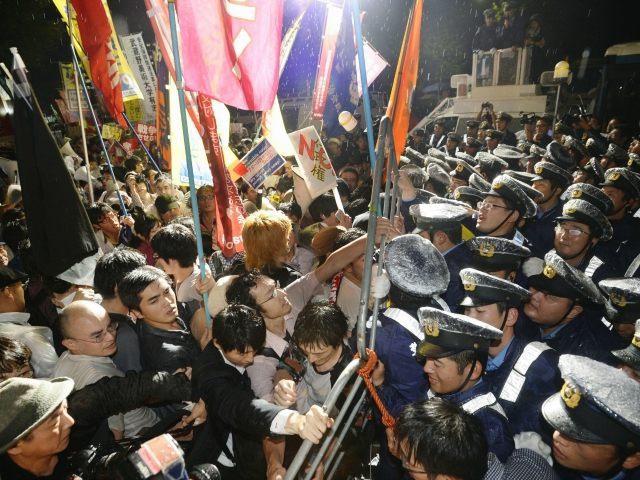The moment of truth is nearly at hand for a bill that would revise Japanese defense policy to let its troops fight abroad, a dramatic change from its postwar military posture.
The bill is supported by the United States, which advocates a stronger Japanese military posture in the face of challenges from China and international terrorism. Some Japanese support for the initiative flows from anger over the Islamic State’s murder of two Japanese hostages in February. There is strong opposition as well, as demonstrated with a series of massive protests, the most recent of which took place on Wednesday night near the Diet building.
Reuters reports thousands of demonstrators were in attendance, despite rainy weather, chanting “scrap the war bills now!” and pressing against police lines intended to keep them from swarming the streets.
Some of the protesters were a bit more creative with their expressions of discontent. The L.A. Times found 71-year-old retiree Kumiko Yokoi singing “Love Me Tender,” with the lyrics modified to castigate Prime Minister Shinzo Abe.
Yokoi felt it was “sneaky and underhanded” for Abe to propose such a significant and emotionally resonant change to Japanese policy without running on the idea during his campaign but said all he wanted to talk about during his run for office was “Abenomics.”
Opponents of the bill worry that it will put Japanese citizens overseas in greater danger, express a profound emotional commitment to Japanese pacifism, or speculate that Abe is in cahoots with corrupt industrialists who want to make money from military contracts.
Interviews with several young demonstrators by the UK Guardian found them skeptical that China truly posed a military threat to Japan, fearful of compulsory military service if Japan was drawn into a war, committed to the postwar tradition of Japanese pacifism, and suspicious that Abe and his party could be using the defense bill as the pretext for a power grab.
Much of the strength for the anti-defense-bill protest flows from existing political organizations created to oppose nuclear power after the Fukushima nuclear disaster or protest a security bill with heavy-handed press controls from earlier in Abe’s administration.
Another common complaint of the protesters is that Abe’s proposed changes are contrary to Article 9 of the 1947 constitution, which states, “the Japanese people forever renounce war as a sovereign right of the nation and the threat or use of force as a means of settling international disputes.”
The bill’s supporters argue that it “re-interprets” the constitutional prohibition against war, which allows Japan to defend itself. The challenges of the current security environment make effective self-defense impossible if Japanese troops are not allowed to deploy overseas, not even to assist allies such as the United States.
“If you look at before this set of legislation and related changes, it was a pretty ludicrous situation where Japanese Self-Defence Forces could barely do anything worthy of the name of defense forces except in a major attack on Japan,” said University of New South Wales professor Alan Dupont, as quoted by Reuters. He interpreted the proposed changes as boosting Japanese military capability and flexibility from about 25 percent of the international norm to 50 percent.
This argument may be strategically reasonable, but it has met stiff resistance from the Japanese legal community, with what the L.A. Times describes as “a large majority of Japan’s legal scholars” believing the bill is unconstitutional. Public opposition is running 54-29 against the bill according to the latest polls. There have been public demonstrations in favor of the bill as well, but they have been considerably smaller.
Despite this opposition, the bill is expected to pass—perhaps as soon as this Friday, since some public holidays are coming up next week. It has already passed the lower house of the Japanese parliament, and Abe is believed to have enough support in the upper house to finish the job.

COMMENTS
Please let us know if you're having issues with commenting.